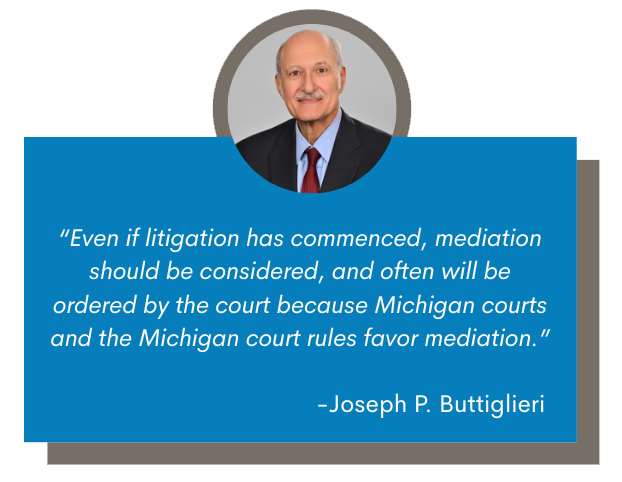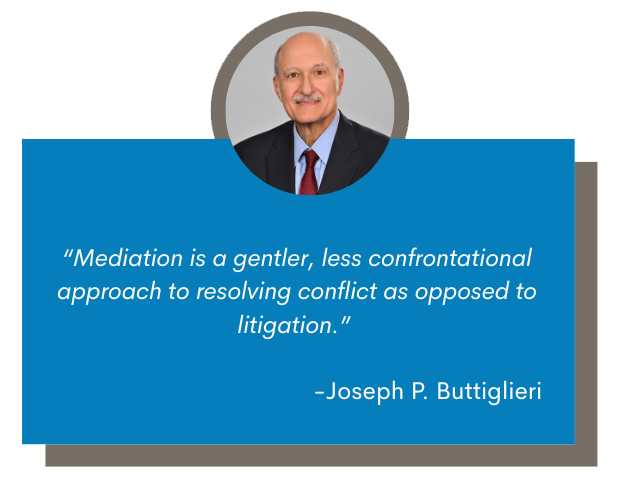Month: January 2023
ALTERNATIVE DISPUTE RESOLUTION
The high cost of litigation and number of cases flooding the courts have many judges and attorneys using alternative dispute resolution (ADR) to significantly cut costs and improve the efficiency of the court system. Clients whose cases qualify for this process often find it simpler and easier than facing off in the courtroom.
In Brief
- In general, ADR involves a mediator, arbitrator, or panel of attorneys depending on the type of ADR chosen, who assists the parties in developing their own outcome to their unique disputes.
- Mediation offers the opportunity for both parties to tell their side of the story in an informal and conversational setting as opposed to an exchange of testimonies in court.
- Arbitration is submission of a dispute to one or more impartial persons for a final and binding determination.
Ch 1: Resolving Conflict Outside of Court
The high cost of litigation and number of cases flooding the courts have many judges and attorneys using alternative dispute resolution (ADR) to significantly cut costs and improve the efficiency of the court system. Clients whose cases qualify for this process often find it simpler and easier than facing off in the courtroom.
What are the benefits of Alternative Dispute Resolution?
Alternative dispute resolution is an appealing option because it can be applied to virtually any type of civil case. In general, ADR involves a mediator, arbitrator, or panel of attorneys depending on the type of ADR chosen, who assists the parties in developing their own outcome to their unique disputes. Once in the courtroom, parties surrender control over the outcome to the judge who ultimately decides the case.

Reasons to settle disputes outside of court
Aside from the obvious reduction in cost, there are three main reasons ADR is more appealing than the formal litigation process. First, all types of ADR give the parties greater control over the procedure and outcome of their dispute than they would have in a courtroom. Next, in any type of ADR, parties have the freedom to add issues to their dispute when they arise as opposed to the courtroom where parties are tied to the issues stated in their initial pleading. Last, ADR provides the parties with privacy that they would not have if their case were to be heard in court. The courtroom is generally open to the public, meaning anyone can walk into the courtroom and hear every detail of your case. Additionally, any papers that are filed with the court are also open to anyone upon request.
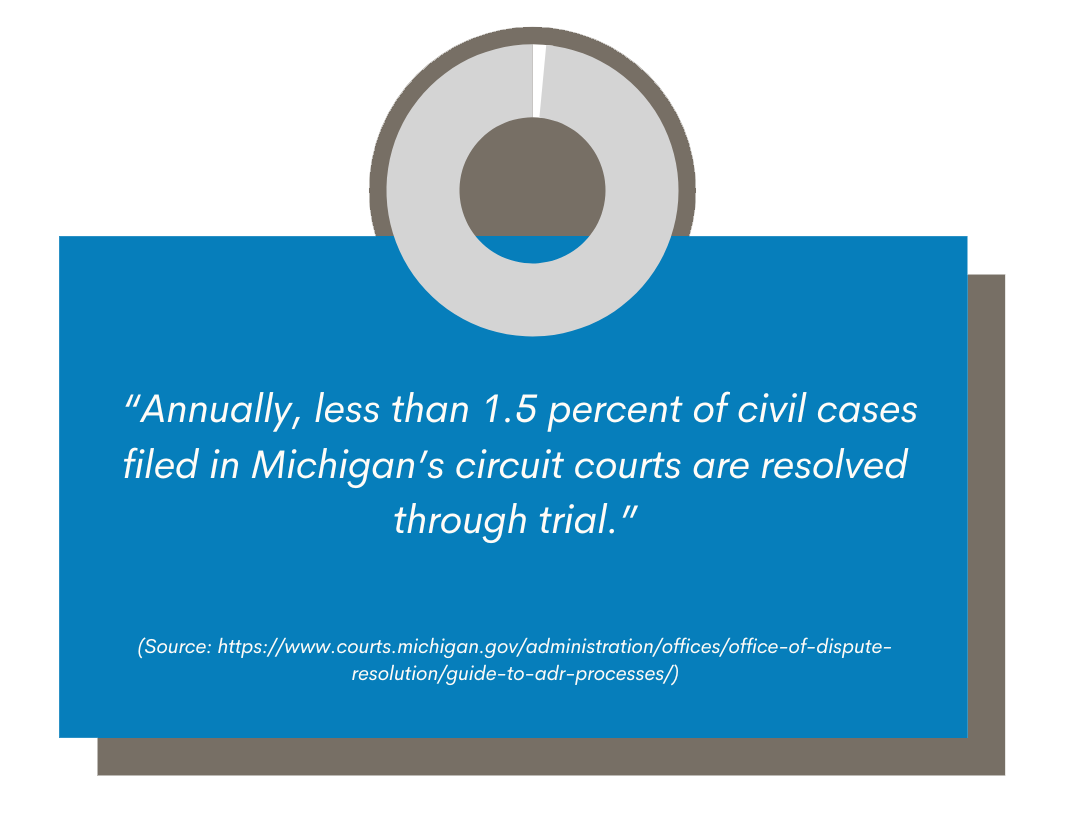
There are several types of ADR. Two of the most commonly used types are mediation and arbitration. I will discuss the details and benefits of each in the following articles with relevant input from Joseph P. Buttiglieri, an attorney with 46 years of experience, 10 of which he has served as a certified mediator. In the meantime, if you are contemplating whether to address a legal issue but don’t want to drag it through the courts, contact us. We can provide information and options to help you move forward.
Ch 2: Mediation, An Informal Alternative
When a dispute arises, whether it be between family members, business partners, landlords and tenants, etc., some are hesitant to pursue court action for a number of reasons with the leading reason being the significant cost of litigation. The mediation process provides parties with an alternative route for conflict resolution that is more cost and time efficient, generally less confrontational, and gives all parties, through the facilitation of the mediator, more control over the final outcome than they would have in court through litigation.
What is mediation?
Mediation is a confidential process where individuals in conflict have the opportunity to be heard, share their ideas for resolution, negotiate such ideas with one another, and come to an agreement that leads to a mutually acceptable resolution. Mediation offers the opportunity for both parties to tell their side of the story in an informal and conversational setting as opposed to an exchange of testimonies in court. A mediator takes on a different role than a judge who makes decisions on behalf of the parties. A mediator assists the parties in communicating their desired outcome to one another, offers suggestions when needed or requested, identifies issues together with the parties, and works with all sides to resolve the identified issues. Mediation allows the parties to have a great deal of influence and control over the decision-making process that leads to the final outcome of their case. In litigation, control over the decision making process is surrendered to the judge who ultimately decides the case in a manner that may leave all parties dissatisfied.
Common misconceptions regarding mediation
A common assumption is that mediation is only available in divorce or family law cases. However, any type of civil dispute can be resolved by mediation. The freedom the parties have in choosing their mediator supports the wide applicability of mediation to virtually any kind of dispute. The parties are able to jointly choose a mediator who is experienced in the specific area of law that their dispute involves and can therefore provide meaningful advice and suggestions in order to reach an outcome that is specifically tailored to the parties’ unique issues. Additionally, because mediation leaves the bulk of the decision making to the parties, who know their case better than any judge would, mediation becomes an appealing option no matter the type of case, as the parties can collectively design their own outcome. Nearly any type of dispute that parties want resolved quickly and inexpensively can be submitted to mediation.
Many people also believe that if parties decide to mediate their case, litigation ceases to be an option. If mediation isn’t progressing in a way that the parties want, the parties can choose to end mediation and bring some or all of the unresolved issues to court for a judge to decide. With this in mind, mediation can be used to consolidate issues before initiating court proceedings as a way to save litigation costs by only bringing the unresolved issues to court. The litigation route also provides a failsafe of sorts for parties in mediation that cannot communicate effectively, despite the assistance of the mediator, and consequently suffer a breakdown in that communication resulting in an unsuccessful mediation. If such a breakdown occurs, the parties can resolve their dispute through formal litigation.
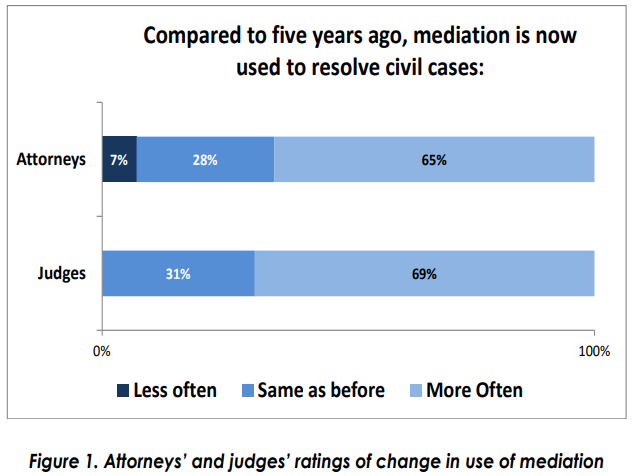
Benefits of mediation
Cost: A primary benefit of mediation compared to litigation is the difference in cost. The litigation process is complex and burdened by procedure that increases attorney fees and costs significantly as attorneys are required to prepare and file documents with the court such as motions, briefs, petitions, responses, etc., attend various court hearings, and go through a lengthy cost-consuming discovery process. In choosing mediation, parties cut the increased costs that litigation often requires. First, the entire mediation process is usually done in one or two full day sessions, depending on the parties’ needs, as opposed to litigation proceedings that can last for months or even years. This almost always reduces costs in addition to saving time. Second, Parties are able to choose their own mediators so they will know that the mediator’s hourly rate immediately and can better gauge how much mediation will cost from the outset. Third and finally, each party submits a mediation summary that gives the mediator the context of the parties’ respective issues. Filing one mediation summary as opposed to the numerous pleadings that are normally filed in litigation proceedings, is itself an enormous reduction in cost.
Maintaining Relationships: If preserving the relationship amongst the parties is a goal, mediation will most likely provide a better outcome than litigation would. According to Joseph P. Buttiglieri, “Mediation is a gentler, less confrontational approach to resolving conflict as opposed to litigation.” In any case, mediation provides better prospects for repairing the relationship between parties as they are free to work together to resolve their issues. In any case, mediation provides better prospects for repairing the relationship between parties as they are free to work together to resolve their issues.
Flexibility: Mediation is less constricting with regard to bringing up new issues. In litigation, the parties are bound by the issues set forth in the pleadings and are restricted from arguing any other issues not in the pleadings. In mediation, parties are free to bring any issues and bring-up new issues as mediation unfolds that can then be addressed and resolved in the same mediation session.
If you have questions about the mediation process or alternative dispute resolution in general, contact us. We can discuss the various options available to you concerning the specifics of your dispute and can offer suggestions for the efficient and effective resolution of your case.
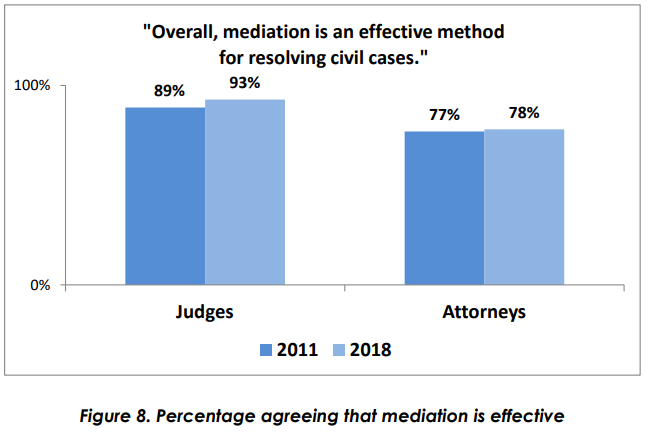
Ch 3: Arbitration, A Formal Alternative
Arbitration is submission of a dispute to one or more impartial persons for a final and binding determination. In comparison to mediation and litigation, arbitration sits in the middle as being a more formal process than mediation but still less formal than litigation.
Differences between arbitration and mediation
In most cases the courts can mandate mediation. Arbitration, however, can only be mandated by the court if the parties enter into a contract that mandates arbitration. If no contract exists between the parties, the parties themselves can choose to arbitrate their dispute, but a court cannot mandate it.
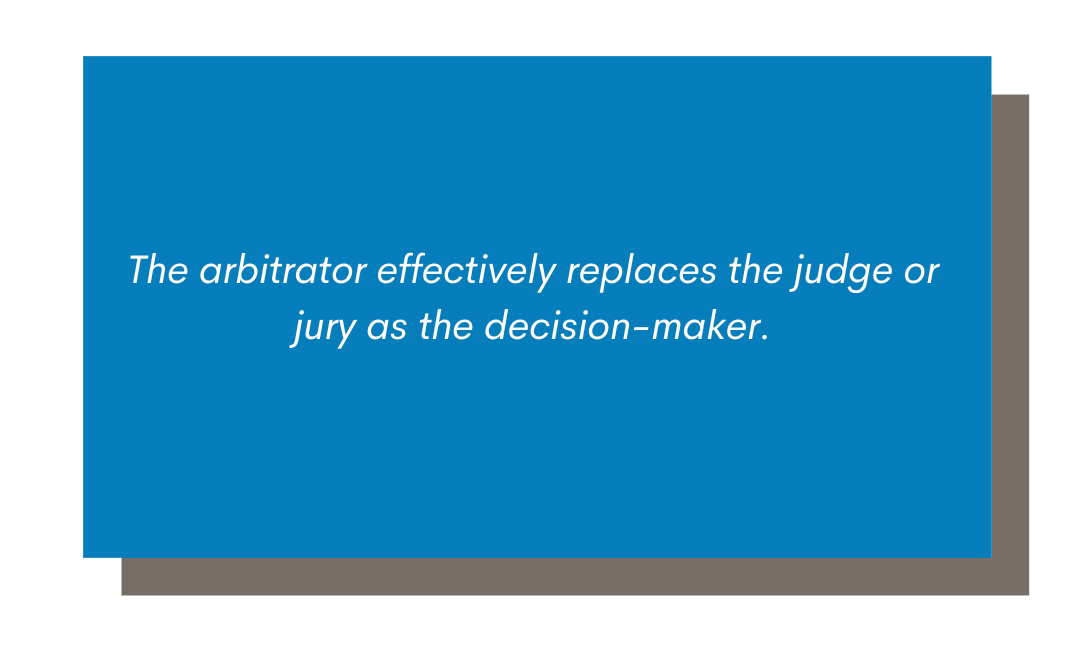
The roles of the arbitrator and mediator are very different. An arbitrator has the power to render a binding decision in the case at hand. The arbitrator effectively replaces the judge or jury as the decision-maker. A mediator, however, works cooperatively with the parties and their suggestions as to resolution can be either accepted or rejected by either party.
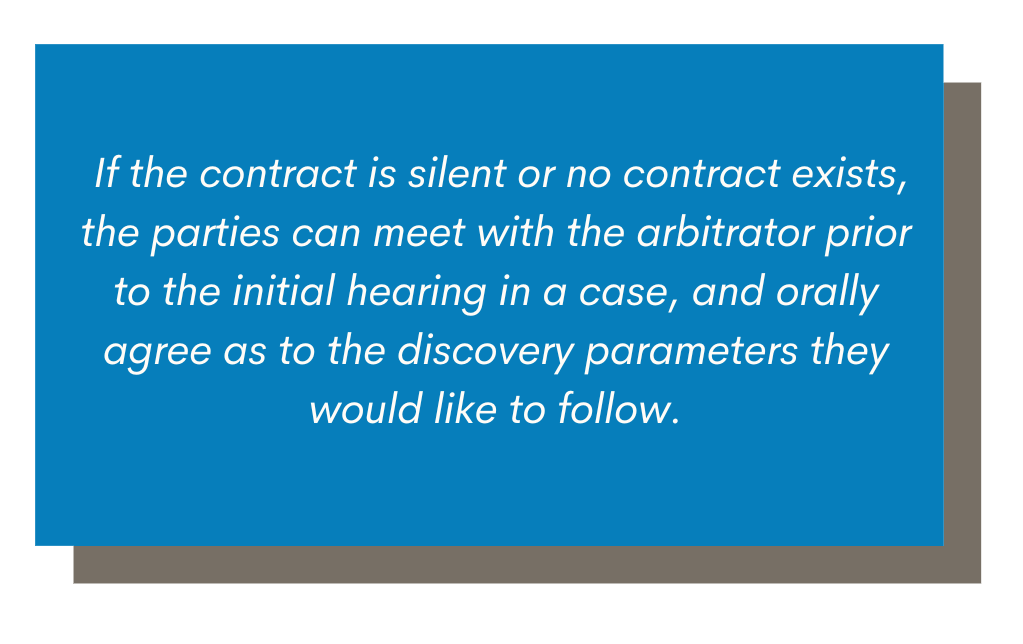
The roles of the arbitrator and mediator in the discovery process also differ significantly. In mediation, the mediator obtains information by, first, the mediation summary that each party to the dispute submits which briefly outlines their argument and lays out the basic facts of the case. At mediation, the mediator conferences with each party separately to obtain more information. Arbitration on the other hand, is first controlled by the contract between the parties if one exists. The arbitration provision(s) in the contract can guide the arbitrator as to what types and quantity of discovery is permissible. If the contract is silent or no contract exists, the parties can meet with the arbitrator prior to the initial hearing in a case, and orally agree as to the discovery parameters they would like to follow. There are also governing arbitration rules that exist to serve as a guide to both arbitrators and parties when forming their discovery agreement.
Common misconceptions regarding arbitration
One of the most common misconceptions concerning arbitration is that decisions from a lawsuit through the litigation route are more enforceable than arbitration awards. Although arbitration awards occur outside the courtroom, they are still enforceable in a judicial forum. Federal and state arbitration acts require courts to not only recognize, but enforce arbitration awards, even if entered in different states. Additionally, because Treaties require foreign courts to enforce arbitration awards entered in another country, the arbitration awards can be as effective as a civil judgment when it comes time to enforce such awards.
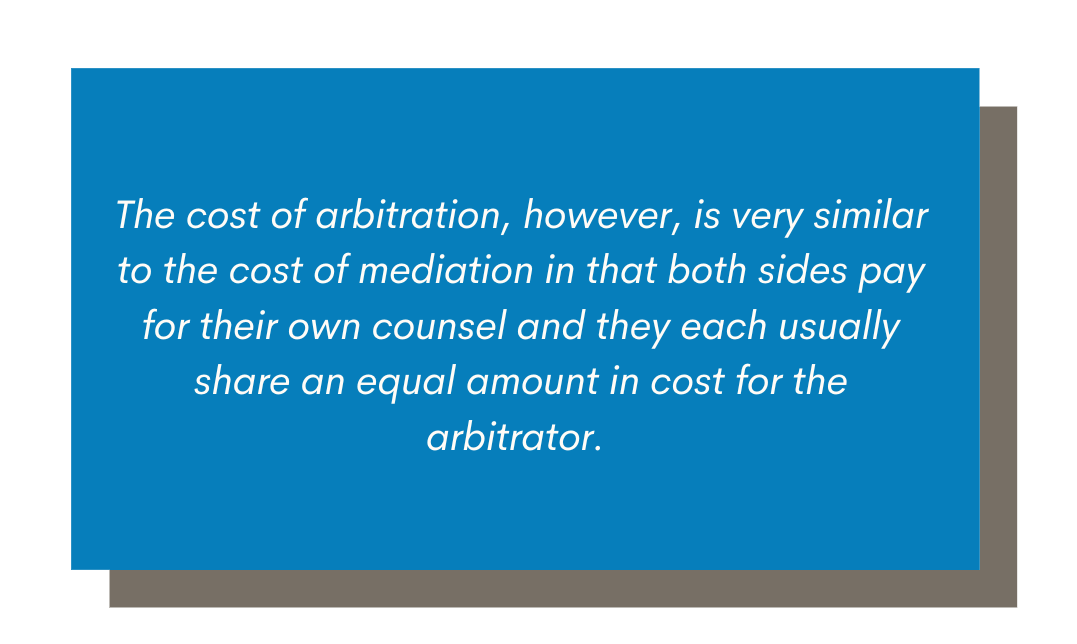
Another misconception that many have concerning arbitration is the cost of arbitration. As discovery proceedings can sometimes mirror discovery in litigation, some people think that arbitration is much more costly than mediation and on par with the cost of litigation. The cost of arbitration, however, is very similar to the cost of mediation in that both sides pay for their own counsel and they each usually share an equal amount in cost for the arbitrator. Additionally, although discovery can be costly, the freedom to set up the discovery parameters by the parties and arbitrator can cut the cost of discovery making it at times, much less than the discovery cost in litigation.
Benefits of arbitration as an alternative to litigation
Efficiency: In comparison to litigation, the resolution of a dispute can happen much sooner through arbitration. Litigation in some cases may take several years to resolve where in contrast, an arbitration award can be reached within months of the start of the arbitration process. Arbitration is also more cost-efficient than litigation. Aside from the lower discovery costs explained above, arbitrators, like mediators, usually bill by the hour or day at similar rates charged by attorneys. This significantly reduces the costs when compared to the cost of litigating a case or dispute. Additionally, because resolution of a dispute generally happens sooner in arbitration than litigation, the attorney fees are significantly reduced. Even though the courts only charge filing fees, litigation can still be more expensive due to scheduling issues, time and cost involved in the attorneys traveling to the courthouse, and the high amount of pleading filed in any given case. Issues that are raised in arbitration proceedings can be communicated to the arbitrator through a phone conference, email correspondence, or a letter, all of which have no filing fees associated with them.
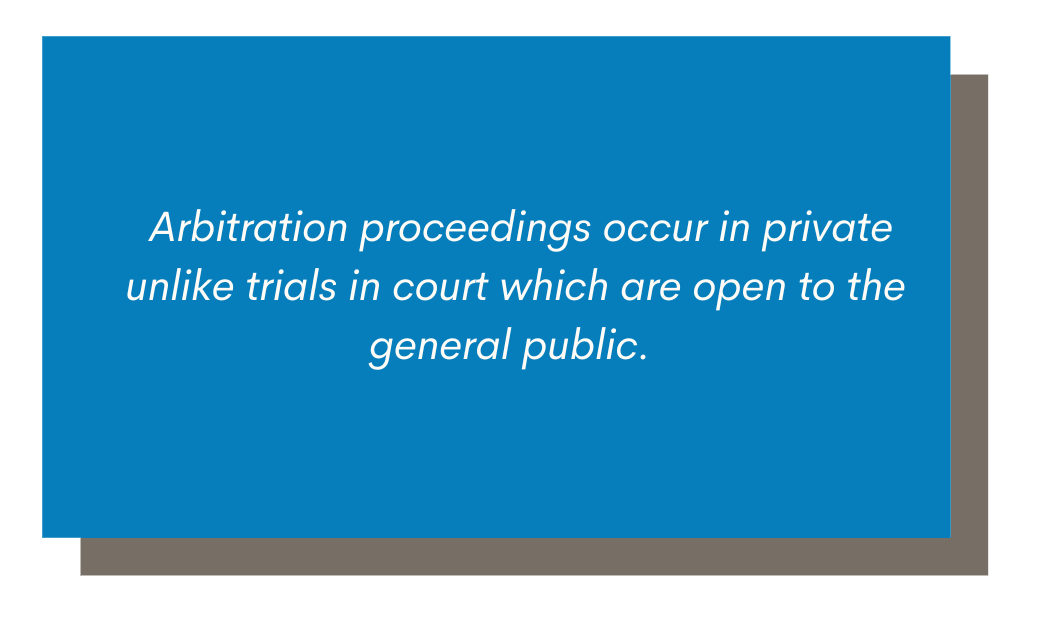
Privacy: Arbitration proceedings occur in private unlike trials in court which are open to the general public. Any information discovered and used in arbitration proceedings can be kept confidential. Hearings before the arbitrator and the final resolution or award can also be kept private and are just between the parties and the arbitrator. In a trial, the general public is able to access information in the case and attend hearings.
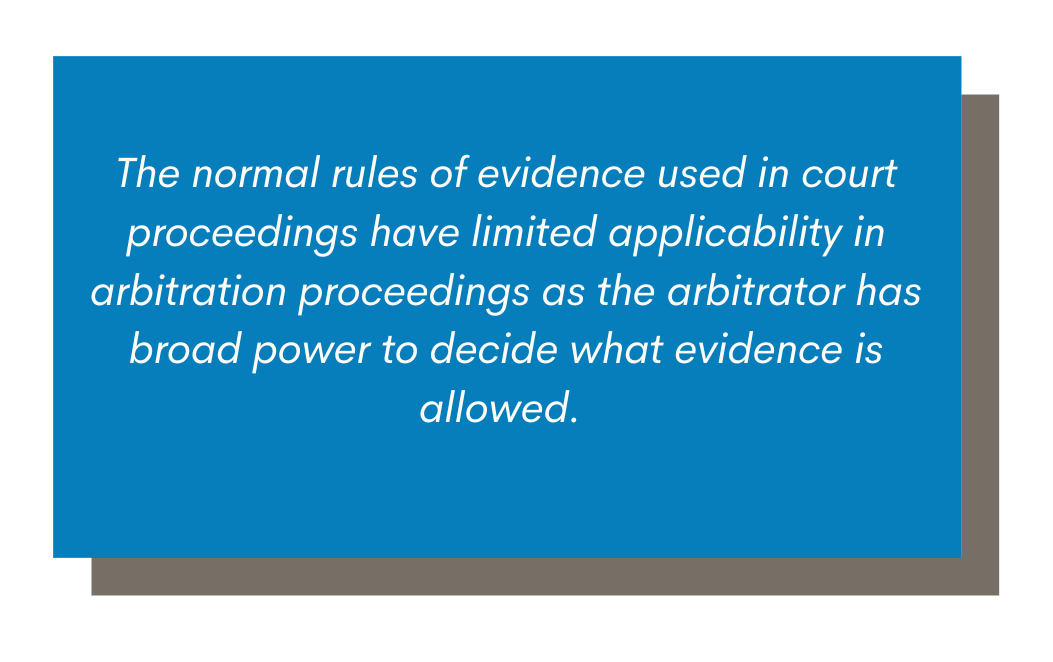
Less Complex: The admittance of evidence is generally simpler in arbitration than the complex process that exists in litigation. The normal rules of evidence used in court proceedings have limited applicability in arbitration proceedings as the arbitrator has broad power to decide what evidence is allowed. Additionally, the lengthy and complex process of discovery in litigation is generally bypassed in arbitration as the parties together with the arbitrator generally decide the process for discovery.
Finality: Because the arbitrator effectively replaces the judge and jury as the decision-maker, it severely limits the parties’ right to appeal the award. In contrast, a court’s decision in a case can be subject to appeals that can add months if not years to the final resolution of your case. The binding decision of the arbitrator gives the parties in dispute finality as to the issues they raised during arbitration as the decision or award is rarely appealable.
If you have questions about the arbitration process or alternative dispute resolution in general, contact us. We can discuss options that will help your case move forward in the most efficient and effective way possible.
Unexpected Values
-Published in Steve Leimberg’s Financial Products Planning email Newsletter, Archive Message #22, December 12, 2022


